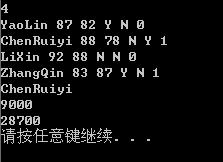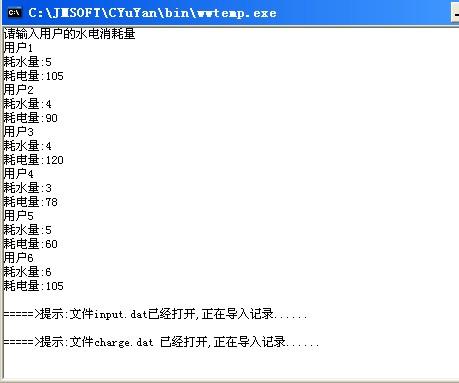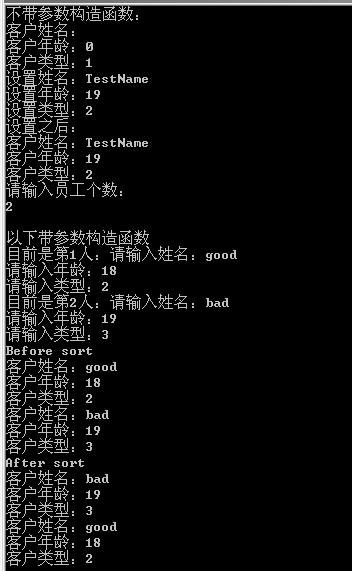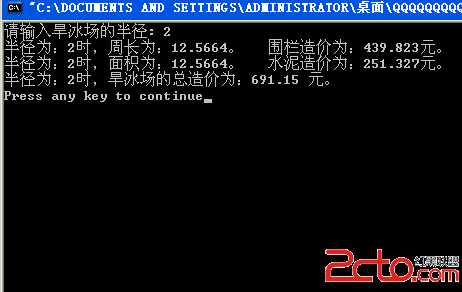POJ 2286 The Rotation Game 搜索-IDA*+迭代加深
本题若用广搜,空间需求量非常大,空间不足。深搜的话,深度很难控制,容易陷入死循环。在这个时候就要用到迭代加深的深搜方法。
所谓迭代加深,就是在深度无上限的情况下,先预估一个深度(尽量小)进行搜索,如果没有找到解,再逐步放大深度搜索。这种方法虽然会导致重复的遍历 某些结点,但是由于搜索的复杂度是呈指数级别增加的,所以对于下一层搜索,前面的工作可以忽略不计,因而不会导致时间上的亏空。
这种方法,可以算作是DFS和BFS的结合。适合大树而可行解不是很深的题目。
IDA*对于最优解层数小,每次扩展状态多的时候是一个杀手锏啊。IDA*就是一个加了层数限制depth的DFS,超过了限制就不在搜索下去,如果在当前层数没有搜到目标状态,就加大层数限制depth,这里还只是一个IDA算法,并不是A*的。当然我们可以用A*的估计函数去剪枝,如果当前深度d+h()>depth的时候就可以不再搜索下去了,这样就是IDA*了。
对于这道题,我们把状态用一维数组存储,然后对每个元素设定相应的编号:
0 1
2 3
4 5 6 7 8 9 10
11 12
13 14 15 16 17 18 19
20 21
22 23 并且把每个操作的相应编号用数组存起来就好处理了:
AC代码:
#include <iostream>
#include <cstdio>
#include <cstdlib>
#include <cmath>
#include <cstring>
#include <string>
#include <vector>
#include <list>
#include <deque>
#include <queue>
#include <iterator>
#include <stack>
#include <map>
#include <set>
#include <algorithm>
#include <cctype>
using namespace std;
typedef long long LL;
const int N=2222222;
const LL II=1000000007;
int n,m,depth;
int vis[2222222],s[24];
int path[N];
int t[4][2]={-1,0,0,1,1,0,0,-1};
char op[]="ABCDEFGH";
int mid[8]={6,7,8,11,12,15,16,17};//中间位置
int fan[8]={5,4,7,6,1,0,3,2};//反方向移动,回归
int xh[8][7]=//8种操作,每次移动7位
{
0,2,6,11,15,20,22,
1,3,8,12,17,21,23,
10,9,8,7,6,5,4,
19,18,17,16,15,14,13,
23,21,17,12,8,3,1,
22,20,15,11,6,2,0,
13,14,15,16,17,18,19,
4,5,6,7,8,9,10
};
int max3(int a,int b,int c)
{
return (a>b?a:b)>c?(a>b?a:b):c;
}
int get(int a[])
{
int i,cnt[4]={0,0,0,0};
for(i=0;i<8;i++)
cnt[s[mid[i]]]++;
return 8-max3(cnt[1],cnt[2],cnt[3]);// 8-返回中间最多的那个数 的数量
}
void move(int k)
{
int i,t=s[xh[k][0]];
for(i=1;i<7;i++)
s[xh[k][i-1]]=s[xh[k][i]];
s[xh[k][6]]=t;
}
bool dfs(int k)
{
if(k>=depth)
return false;
int i,h;
for(i=0;i<8;i++)
{
move(i);
path[k]=i;
h=get(s);
if(h==0)
return true;
if((k+h)<depth&&dfs(k+1))//当前的步数加还需要的最少步数<depth
return true;
move(fan[i]);//移回来
}
return false;
}
int main()
{
int i,j;
while(scanf("%d",&s[0])&&s[0])
{
for(i=1;i<24;i++)
scanf("%d",&s[i]);
depth=get(s);//差最少的步数
if(depth==0)
{
printf("No moves needed\n%d\n",s[mid[0]]);
continue;
}
while(!dfs(0))
depth++;//如果不行,最少步数+1
for(i=0;i<depth;i++)
printf("%c",op[path[i]]);
printf("\n%d\n",s[6]);//输出中间位置的数字
}
return 0;
}
#include <iostream>
#include <cstdio>
#include <cstdlib>
#include <cmath>
#include <cstring>
#include <string>
#include <vector>
#include <list>
#include <deque>
#include <queue>
#include <iterator>
#include <stack>
#include <map>
#include <set>
#include <algorithm>
#include <cctype>
using namespace std;
typedef long long LL;
const int N=2222222;
const LL II=1000000007;
int n,m,depth;
int vis[2222222],s[24];
int path[N];
int t[4][2]={-1,0,0,1,1,0,0,-1};
char op[]="ABCDEFGH";
int mid[8]={6,7,8,11,12,15,16,17};//中间位置
int fan[8]={5,4,7,6,1,0,3,2};//反方向移动,回归
int xh[8][7]=//8种操作,每次移动7位
{
0,2,6,11,15,20,22,
1,3,8,12,17,21,23,
10,9,8,7,6,5,4,
19,18,17,16,15,14,13,
23,21,17,12,8,3,1,
22,20,15,11,6,2,0,
13,14,15,16,17,18,19,
4,5,6,7,8,9,10
};
int max3(int a,int b,int c)
{
return (a>b?a:b)>c?(a>b?a:b):c;
}
int get(int a[])
{
int i,cnt[4]={0,0,0,0};
for(i=0;i<8;i++)
cnt[s[mid[i]]]++;
return 8-max3(cnt[1],cnt[2],cnt[3]);// 8-返回中间最多的那个数 的数量
}
void move(int k)
{
int i,t=s[xh[k][0]];
for(i=1;i<7;i++)
s[xh[k][i-1]]=s[xh[k][i]];
s[xh[k][6]]=t;
}
bool dfs(int k)
{
if(k>=depth)
return false;
int i,h;
for(i=0;i<8;i++)
{
move(i);
path[k]=i;
h=get(s);
if(h==0)
return true;
if((k+h)<depth&&dfs(k+1))//当前的步数加还需要的最少步数<depth
return true;
move(fan[i]);//移回来
}
return false;
}
int main()
{
int i,j;
while(scanf("%d",&s[0])&&s[0])
{
for(i=1;i<24;i++)
scanf("%d",&s[i]);
depth=get(s);//差最少的步数
if(depth==0)
{
printf("No moves needed\n%d\n",s[mid[0]]);
continue;
}
while(!dfs(0))
depth++;//如果不行,最少步数+1
for(i=0;i<depth;i++)
printf("%c",op[path[i]]);
printf("\n%d\n",s[6]);//输出中间位置的数字
}
return 0;
}
补充:软件开发 , C++ ,




